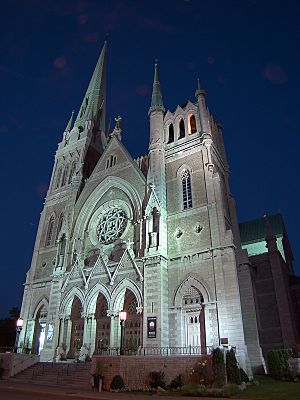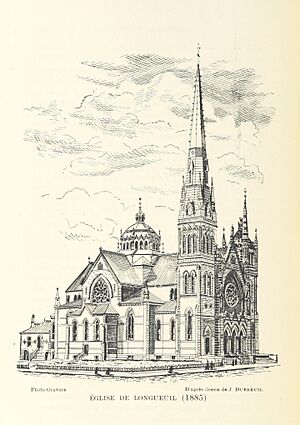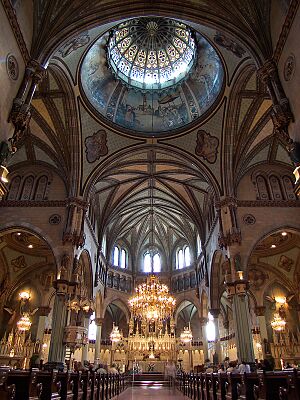Co-Cathedral of Saint-Antoine-de-Padoue facts for kids
Quick facts for kids Co-cathédrale Saint-Antoine-de-Padoue |
|
|---|---|
 |
|
| 45°32′25″N 73°30′29″W / 45.540289°N 73.507931°W | |
| Location | Longueuil, Quebec |
| Country | Canada |
| Denomination | Roman Catholic |
| History | |
| Status | Co-cathedral |
| Founded | 1698 |
| Dedication | St. Anthony of Padua |
| Consecrated | 27 January 1887 |
| Architecture | |
| Functional status | Active |
| Architect(s) | Albert Ménard (1847-1909), Henri-Maurice Perrault (1857-1909) |
| Style | Gothic Revival |
| Groundbreaking | 1884 |
| Completed | 1911 |
| Construction cost | $98,895 |
| Specifications | |
| Length | 74 metres (243 ft) |
| Width | 41 metres (135 ft) |
| Height | 81 metres (266 ft) |
| Materials | Stone |
| Administration | |
| Parish | Saint-Antoine-de-Padoue |
| Archdiocese | Montreal |
| Diocese | Saint-Jean-Longueuil |
The Co-Cathedral of Saint-Antoine-de-Padoue is a special church in Longueuil, Quebec, Canada. It is located on the south shore of Montreal. This beautiful church is dedicated to St. Anthony of Padua.
A "co-cathedral" is a church that shares the role of a main church (a cathedral) with another church in the same area. This means it's a very important church! Inside, you can find the remains of the Blessed Marie-Rose Durocher. She was the founder of the Sisters of the Holy Names of Jesus and Mary.
The government of Quebec recognized the cathedral as a historical monument in 1984. This means it's a very important building with a lot of history.
Contents
History of the Co-Cathedral
The land where the cathedral stands has a long history. It was once the site of Fort Longueuil. This fort was built between 1685 and 1690. It was the home of Charles le Moyne de Longueuil, a very important person in Canadian history. The fort was taken down in 1810. Some of its original stone was used to build the cathedral you see today. This site was named a National Historic Site of Canada in 1923.
The church community, called the Parish of Saint-Antoine-de-Padoue, started in 1698. It is one of the oldest parishes in Canada! The current cathedral building was mostly built from 1884 to 1887. However, it wasn't fully finished until 1911. This is the third church building in Longueuil's history. The first one was completed in 1811.
Saint-Antoine-de-Padoue became a co-cathedral in 1982. This happened when the name of the local Catholic area changed. Before 1982, it was just a regular parish church.
Important events have taken place here. For example, a funeral was held for Jean-Pierre Côté, a former Lieutenant Governor of Quebec, in 2002. In 2005, people gathered at the cathedral to remember Pope John Paul II after he passed away. They also welcomed the new Pope, Pope Benedict XVI.
Architecture and Design
The Co-Cathedral of Saint-Antoine-de-Padoue has a beautiful design. It was built in the Gothic Revival style. This style often features tall spires, pointed arches, and large windows. The dome of the cathedral, however, is in a different style called Byzantine Revival.
The architects who designed this grand building were Henri-Maurice Perrault and Albert Mesnard. They wanted the cathedral to be very large and impressive. These same architects also designed the church's altar. It combines beautiful, fine stones with very hard stone. A Quebec sculptor named Louis-Philippe Hébert helped with the outside of the cathedral. He created three sculptures made of wood and covered them in metal. The church cost about $98,895 to build.
The cathedral is truly huge! It is about 74 metres (243 ft) long, 41 metres (135 ft) wide, and 81 metres (266 ft) high. Imagine how tall that is! In 1930, Louis Jobin helped renovate the church. Later, in 1999, the roof was restored. It had been covered in steel, but it was replaced with 60,000 pounds (27,000 kg) of copper.
What Happens at the Cathedral
The Co-Cathedral is an active church. Mass is usually held twice from Monday to Friday. It happens once on Saturday and four times on Sunday. The confessionals are usually ready fifteen minutes before Mass begins.
About one-third of the cathedral is full for weekend services. During the week, it's less than one-sixth full. There are about 9,400 Roman Catholics in the parish. The church leaders often organize events to raise money. This money helps pay for repairs and updates to the cathedral and the nearby rectory (where the priests live).
In a special area called the crypt, you can find the graves of the Le Moyne and Grant families. These families are connected to the title of Baron de Longueuil.
Priests of the Parish
Inside the cathedral, there is a plaque that lists all the priests who have served the parish throughout its history. Here is a list of some of them:
| Name | Years | Name | Years |
|---|---|---|---|
| Pierre Millette | 1698-1701 | L. Moïse Brassard | 1840 -1855 |
| Pierre de Francheville | 1701-1713 | Georges-Amable Thibault | 1855-1883 |
| Fr. Nic. Ber. Constantin | 1713-1715 | Maximilien Tassé | 1883-1901 |
| Claude Dauzaf | 1715-1717 | J.-Georges Payette | 1901-1938 |
| François Céré | 1717-1720 | Mgr. Albéric Picotte | 1938-1943 |
| Joseph Isambart | 1720-1763 | Mgr. Romain Boulé | 1943-1962 |
| Claude-Charles Carpentier | 1763-1777 | J. Alcide Careau | 1963-1974 |
| Charles-Basile Campeau | 1777-1782 | Jean-Louis Yelle | 1974-1983 |
| J.-Étienne Desmeules | 1783-1789 | Jean-Hugues Trudeau | 1983-1995 |
| Mgr. Pierre Denaut | 1789-1806 | Raymond Poisson | 1995-2007 |
| Augustin Chaboillez | 1806-1834 | Yves Le Pain | 2007- |
| Antoine Manseau | 1834-1840 |
See also
 In Spanish: Concatedral de San Antonio de Padua (Longueuil) para niños
In Spanish: Concatedral de San Antonio de Padua (Longueuil) para niños



